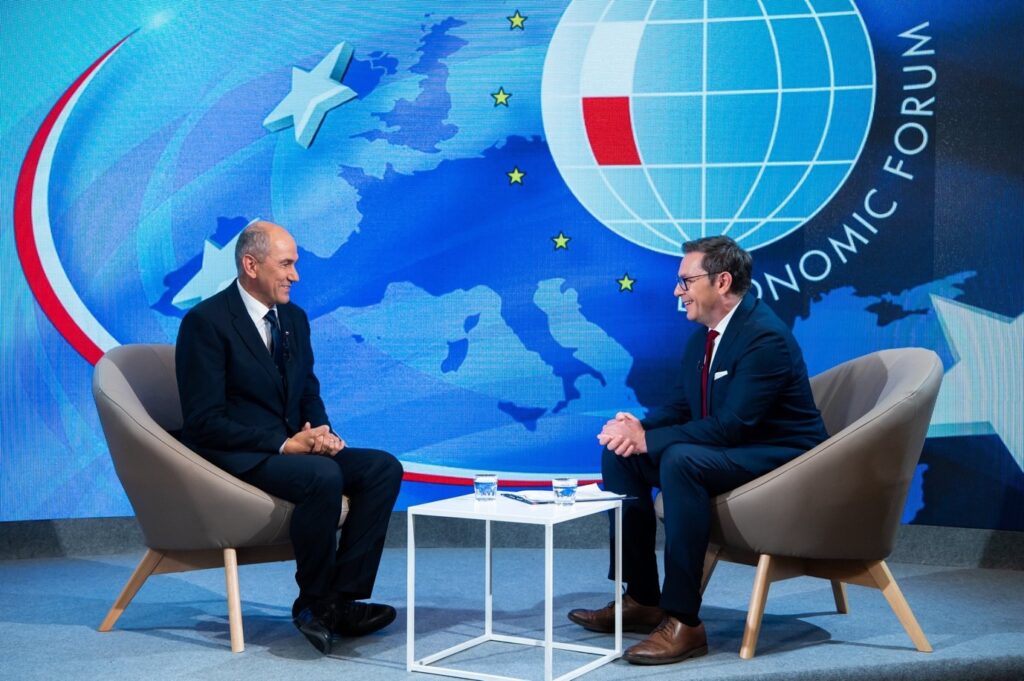While attending the Economic Forum in Poland, where he received the award for Person of the Year 2020 for Central and Eastern Europe, the Prime Minister of Slovenia, Janez Janša, gave an interview to the Polish national television TVP. He initially emphasised that he is very honoured by the award and then also spoke about the Slovenian Presidency of the Council of the European Union, the priorities of the Presidency, Europe’s recovery and its resilience to the pandemic, the attitude of European institutions towards Poland, the need to transform the Slovenian judicial system, the European law and national constitutional systems, double standards, Belarus, securing the European borders, Afghanistan, as well as legal and illegal migrants.
“The first goal of our Presidency is to recover from the pandemic and also fight it. This Presidency is full of challenges, as the pandemic has an impact on all of the other goals on the agenda. But in addition to the pandemic, there are many other challenges that have arisen, which we were not planning on addressing initially. Among the goals that were planned is, among other things, information security, which is of strategic importance.” According to Prime Minister Janez Janša, we are often unaware of the importance of this topic, adding that a conference on this topic was recently organised. “Europe has finally started working on its capabilities to combat cyber threats,” he added.
“Following what has happened in Afghanistan, we have finally reached a very important agreement on the need to secure Europe’s borders and strictly distinguish between legal and illegal migration. As we said at the beginning, there will be no humanitarian corridors for anyone. After ten days, we were able to make a unanimous statement on this topic, which has happened for the first time since the 2015 migrant crisis.” The Prime Minister also stressed that Slovenia is also planning to address many other issues, including the plan for recovery and resilience. “We are working hard to ensure that these packages or measures would not only aim to bring us back to the pre-pandemic state in our recovery but also that the recovery would be used for a green and digital transition. This is a big project for the whole of Europe.”
The judiciary in Slovenia has structural problems
When asked about the relationship between Slovenia and Poland and about the fact that he had repeatedly defended Poland in Brussels, the Prime Minister replied that he had not only defended Poland but also fought for Europe as a whole, for our values, for Slovenia. “In this situation, when some European institutions are trying to paint Poland as one of the opponents of European standards and values, I am noticing the extensive use of double standards.” He then gave a concrete example. “If I compare the judicial reform that is taking place in your country with the state of justice in my country, it is clear to me that those who are dealing with this issue should definitely focus more on Slovenia than on Poland because we have big problems. We need to carry out reforms similar to yours, but we do not have enough political power.” He pointed out that the judiciary in Slovenia had structural problems stemming from an unfinished transition. “We are trying to tell our colleagues in Brussels that we have big problems, we are monitoring Poland’s actions in case a reform happens – the reform that Brussels bureaucrats are attacking – and asking them to tell us what to do, how to solve this situation, but they are still silent. They do not see any problems with the rule of law and justice in Slovenia, despite the fact that these actually exist. That is why I am completely on your side on this issue.”
EU law is not above national constitutions
When asked whether the legislation of any EU member state is more important than the legislation of the EU, Janša answered that the regular legislation in the EU member states must somehow be harmonised with the European framework. “European laws and the European legal framework must be in line with national constitutions, so that the EU law is not above the national constitutions. This is very clear, and not only in the case of Poland or Slovenia. We have seen the German Constitutional Court discuss and decide on whether certain EU directives are in line with the German Constitution. The Slovenian Constitutional Court and the Polish Constitutional Court have the same right. It is not possible for someone in Brussels to issue a decree that is contrary to a country’s constitution and tell the country that it must abide by it. We have all harmonised our legal systems, the fundamental principles of our legal systems, when we joined the EU. We also signed the Treaty of Lisbon, based on the harmonisation.”
He expressed regret regarding the current situation in Belarus and reiterated the need for Europe to secure its borders. When asked whether there are also politicians in Europe who would willingly accept illegal immigrants, Janša answered that those who claim they would gladly accept them are not doing so for humanitarian, but for political reasons. “They want to import new voters. This is clearly stated in the political programmes of certain parties; it is no secret. It is not difficult to distinguish between refugees trying to save their lives and illegal immigration.” He recalled the war in Bosnia and the refugees who were coming to our country back then. Namely, more than 70,000 of them came to Slovenia at the time. “People of different nationalities, it was mostly the elderly, women and children who came, as the men were fighting. We helped everyone, as it was clear that they were refugees. Many other countries have acted similarly,” Janša said in the conclusion of the interview.
Nina Žoher


